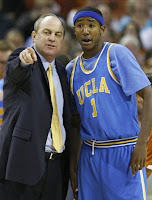 UCLA players will tell you that coach Ben Howland is "persistent."
UCLA players will tell you that coach Ben Howland is "persistent."According to this story in yesterday's LA Times, "most of what the coach tells his players -- repeatedly -- relates directly to UCLA's trademark style of play. Aggressive on defense. Careful with the ball on offense. Lots of effort."
Asked about the most common daily reminders, players mentioned the same five things, in slightly different order depending on the demands of their positions. This wholly unscientific poll provides a refresher course on basketball the Howland way.
1. Hedging screens: "If you're on defense and your man sets a ball screen, it is your responsibility to jump out on the dribbler until your teammate fights through the screen. Then you scramble back to the man you're guarding."
Says one UCLA player: "That means you keep pressure on the ball. The opponent can't really make a pass because there's that constant pressure."
2. Stay in front of your man: "No gimmicky zones or junk defenses for Howland. His team plays man to man, working to pressure the ball, stop penetration off the dribble and contest every shot."
"Just to compete," guard Jrue Holiday said. "Just to play hard."
3. The jump-stop: "Howland wants his dribblers to come to a stop with their feet planted. He believes that too many players come down the court, leave the ground, and then look to pass, which can lead to turnovers."
4. Rebound: "The coach believes that hitting the boards is crucial to his team's chances this season. This message extends beyond the big men. Josh Shipp, a 6-foot-5 senior who plays on the wing, ranks among the Bruins' top defensive rebounders, and Holiday is averaging 4.2 rebounds."
5. Transition defense: "The guards have to get back and the big men hustle after them, looking to deny easy baskets."
"If you're not doing it right, then he will make sure you're doing it right," [Drew] Gordon said. "He doesn't just kind of blow it off and move on to the next thing. He doesn't care if it takes up all practice, as long as you get it right."
As the author writes, "Given that college players can be adept at tuning out their coaches, Howland gets his message across for one simple reason. As Collison explained: 'We've been to the Final Four three consecutive times.'"



